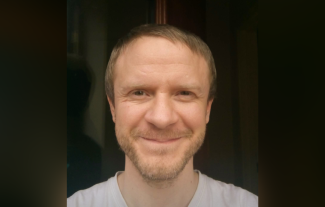
People don't see what's going on underneath the surface

Harry Donaghy talks candidly about the depression and extreme feelings he experienced around his stammer. But then a chance meeting made him realise he wasn't alone.
My name is Harry and I'm from Belfast. I started stammering when I was a little child but the pain of having a stammer didn't start until my adolescence.
Growing up with a stammer was extremely hard for me. I had speech therapy when I was a child but it didn't help me. I spent most of my time at home. I didn't speak, not even to my own family. I was so afraid to talk; I didn't want people to hear me stammering. I stayed silent. That went on for years.
I thought I wouldn't be able to succeed in life.
Stammering had a severe negative impact on my mental health. I felt depressed. I remember saying to my Mum "Am I going to stammer for the rest of my life?" She didn't answer. I thought I wouldn't be able to succeed in life. I knew what my life was going to be like. I was so afraid to speak to people. I thought I wouldn't be able to have conversations and form relationships. I was basically a mute.
The thought of stammering for the rest of my life made me so unhappy I even felt suicidal. When I was 15 I attempted to end my life and then again a few years later. That time, I woke up in hospital and a doctor told me that I nearly died.
Realising I wasn't alone
I got so depressed being at home all the time, so I decided to enrol in a cookery course at Belfast Metropolitan College. A lady who worked at the college, Bernadette, noticed that I had a stammer and told me that she stammered too. I'm so glad I met her — I suddenly felt that I wasn't alone. Bernadette understood what stammering was like. Most people don't. They just see the person stammering. They don't see what's going on underneath the surface: the depression, sadness, loneliness, frustration, shame and embarrassment.
Bernadette told me she went on a course by The McGuire Programme which helped her, and suggested I go too. So she and my cookery course tutor Gavin, who I also felt comfortable talking with, decided to help me get onto the programme, and the college paid for it.
Now I speak to people on the phone and when I'm in town, and I find that most people are quite sweet and friendly. They're very patient, they take their time with me.
It's helped me to learn a speaking technique to control my stammer called costal breathing, and I speak slowly from my costal diaphragm. I'm working on my speech at the moment and I use my speaking technique with people in the real world. I feel like it's given me the freedom to speak and the confidence to meet and socialise with others — something I only dreamed about before I joined the programme. Now I speak to people on the phone and when I'm in town, and I find that most people are quite sweet and friendly. They're very patient, they take their time with me. I'm not in employment at the moment but I will be doing a health and social care course in September, which I'm really looking forward to.
If you're ever feeling depressed, get help. Suicide is not the answer. Before I met Bernadette and went on the course, I thought that I was the only person who suffered. I knew other people stammered but I thought that I was the only person that felt the pain of having a stammer. But now I'm looking ahead.
If you are feeling low because of stammering, why not talk to us on webchat or helpline. Our volunteers all have a close connection with stammering so they know what it's like.
The McGuire Programme is one of a number of courses for people who stammer. Read more about the range of options on our One-to-one Adult Speech & Language Therapy, Adult Stammering Courses and Stammering & Mental Health pages.
Would you like to write an article? See Submit Something For The Site page or email editor@stamma.org to find out how.



































